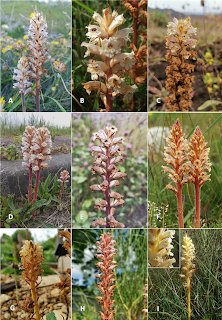 |
| Ian browsing a copy of 'Stace' Image: L. Marsh |
Ian took over the editorship of British & Irish Botany's predecessor, New Journal of Botany, in 2015, just weeks after his term as BSBI President ended; he oversaw the setting up of British & Irish Botany and has been at the helm for the last five years. So this really is the end of an era!
Don't worry about the future of the journal - Ian has overseen the succession plans and we'll be announcing the new Editor-in-Chief very soon - but for now, I'd like to hand over to Ian to tell you about what's in this latest issue of British & Irish Botany:
"Publication of Issue 5(3) of British & Irish Botany (B&IB) completes the fifth year of the Botanical Society of Britain & Ireland's online scientific journal. Over this period there have been 18 issues containing 136 papers covering the taxonomy, history, origins, ecology and conservation of the British and Irish flora. The appearance of each issue has traditionally been accompanied by a blogpost from Louise Marsh summarising the contents and highlighting findings of particular significance. On this occasion, in light of my retirement as editor-in-chief, she has graciously stepped aside and delegated this task to me!
 |
| Hieracium elizabethae-reginae Image: T. Rich |
"Ridha El Mokni and Duilio Iamonico explore aspects of nomenclature within the genus Gypsophila which, although not native to Britain and Ireland, contains several species that have been reported as garden escapes or casuals from other sources, and may become more frequent under changing climatic conditions. Frank Horsman investigates in detail the contributions of the 17th century botanist Edward Morgan, to knowledge of the Welsh flora in particular. Morgan emerges from this account as something of an unsung hero whose work and influence on contemporaries deserves much more recognition and respect than it is presently accorded.
 |
| Artemisia campestris subsp. maritima Image: J. Twibell |
"The theme of Welsh plants extends through the remaining two papers in the issue. Field Wormwood (Artemisia campestris) is a rare, iconic and native component of the Breckland flora, but also grows as a distinct subspecies (maritima) on the Sefton coast in Lancashire and at Crymlin Burrows in South Wales. Andy Jones and Fred Rumsey review evidence from various sources that collectively tip the balance in favour of maritima plants being recent arrivals on our shores, in direct contrast to their Breckland counterparts.
"Fred Rumsey (again!) and Chris Thorogood (authors of the BSBI Broomrapes Handbook) detail the history, distribution and ecology of Picris Broomrape, Orobanche picridis. This has proved a challenging taxon due to nomenclatural confusion and morphological similarity to Common Broomrape, Orobanche minor. Most botanists to date (including me) have sought it on chalk in east Kent and on the Isle of Wight. While confirming its continued presence at these locations, the authors also report the discovery of a huge newly-discovered (and presumably previously overlooked) colony on private land in South Wales.
 |
| Orobanche picridis Images: C. Thorogood & F. Rumsey |
"Editing the journal for five years has been a fair commitment of time, but also rewarding in that I have learned a great deal from the contents of papers and have enjoyed stimulating and productive interactions with authors. I thank Louise Marsh for exceptional editorial assistance, Jonathan Shanklin for meticulous proof-reading, and all who have supported the journal by reviewing manuscripts and contributing papers. May British & Irish Botany continue to thrive under new management!"
Huge thanks to Ian for all he has done to establish British & Irish Botany - it has been a delight to assist him!
I hope he will enjoy having more time for all his other botanical interests, including being BSBI's joint County Recorder for Hertfordshire, BSBI's joint referee for orchids, sitting on BSBI's Science & Data Committee.... he's not so much retiring as re-calibrating!
So it just remains for me to point you to the latest issue of British & Irish Botany and say "watch this space" for news about Ian's handover to his successor.
No comments:
Post a Comment
Please leave a comment!